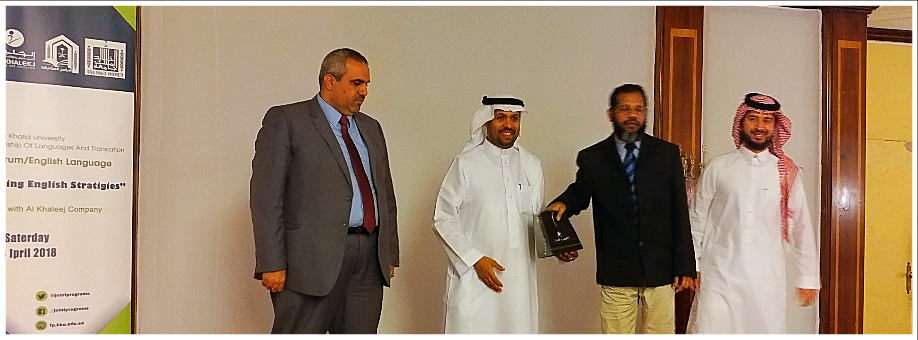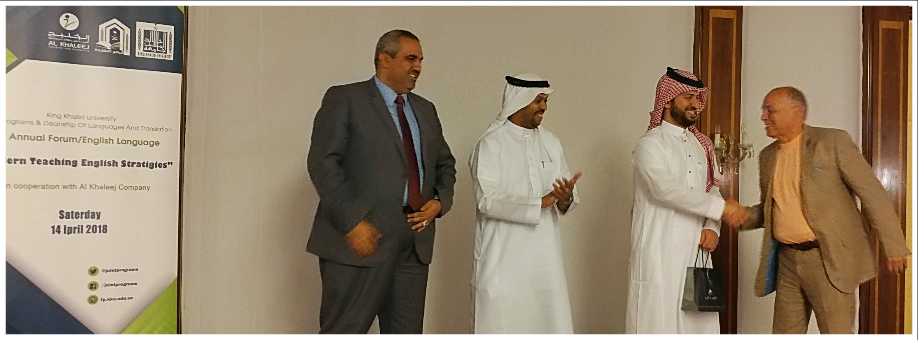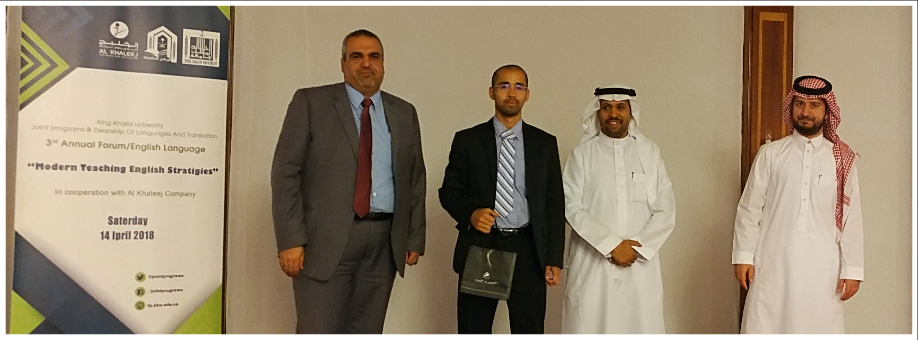Dean Al-Melhi and Dr. Bader Eddin Participate in Sports Governance Forum
Under the auspices of Asir Gov. Prince Turki bin Talal bin Abdul Aziz, the Sports Governance Forum was held on Jan. 20, 2020, from 10 a.m. to 3 p.m. at Abha Palace Hotel. The main purpose of the two-session forum, hosted by Abha Sports Club, was to gather key stakeholders from around the Kingdom and from abroad to learn the unique challenges of sports governance, drive new initiatives, and implement coordinated solutions. Faculty of Languages and Translation Dean, Dr. Abdullah Al-Melhi, and Dr. Eyhab Bader Eddin, MITI, were provided with a special invitation. Dr. Bader Eddin was tasked with providing simultaneous interpreting in the two language combination, i.e. English and Arabic. He translated for the Arab guests what was said by the 2 English guest speakers who in turn got the English translation of what speakers said in Arabic, all done simultaneously. At the end of the Forum, Dean Al-Melhi provided consecutive interpreting for the questions posed to the English speakers before the lens of a TV channel.
Dr. Bader Eddin first provided simultaneous interpretation for Director of Risk and Governance at Everton FC, Paul McNicholas. Mr. McNicholas generated a lot of interest with his vast background in the Premier League, the top tier of English Football. Specifically, he manages all of the processes in place to protect Everton FC, a professional football club based in Liverpool, England. Mr. McNicholas's presentation was titled 'The English Experience in the Governance of Sports Clubs'. After, interpretation was provided for Real World Academies Managing Director, James Tucker. Mr. Tucker emphasized the importance of governance in education and sports clubs, citing examples from different academies from different parts of the world like Spain, etc. His presentation was titled 'The Importance of Governance in Education and Training in Sports Clubs'.
The event included a notable selection of speakers that included:
Advisory (Shura) Council member Dr. Muhammad Al-Abbas;
Dr. Marea Al-Habbash from King Khalid University;
Dr Ahmed Al-Hadithi, President of Abha Sports Club;
Advisor to the Chairman of the Board of the General Authority for Sports, Abdulaziz Al-Masaad;
Director of the Internal Audit Office at Dubai Sports Council, Khaled Al-Shezawi;
Dr Muqbel bin Jdei, Professor of Sports Marketing and Development;
Lawyer Fahad Muhammed.
Dean Al-Melhi recognized Dr. Badder Eddin for his community service commitment and asserted that the Faculty of Languages and Translation was honored to receive the task to interpret to a live audience and national broadcast for the guest speakers. It is worth mentioning that simultaneous interpreting is considered a type of interpreting that tops the list of other modes or types of interpreting in terms of difficulty. This is so because the simultaneous interpreter has to master the faculty of splitting senses in that he listens, understands, analyzes and then encodes the source text message in the other language, all in real-time. Simultaneous interpreting is seen as very hard because it involves 3 layers of problems: A) speed with which an interpreter must make decisions regarding lexical choice, grammar usage, etc, B) enormous tension and pressure to keep up with the rapid flow of spoken language, and C) the background knowledge necessary for instant recall, Dr. Bader Eddin mentioned. Last but not least, it is worth mentioning that Dr. Bader Eddin has provided and continues to provide simultaneous interpreting at high-profile events for high-profile dignitaries in Syria, European Union, Kuwait, Oman and Saudi Arabia. Dr. Bader Eddin is technically called 'FREE Simultaneous Interpreter' in that he has NO access to the text or speaker's notes, and the interpretation he provided was performed with NO look-ahead, under severe time pressure and with no safety net. The difficulty of the interpreting mode stems from the fact that the interpreter has little or no chance to look things up or go back on what he has said: the first pass is final. The interpreter has to tune in to the speaker's train of thought, expressing it precisely and as naturally as possible. Although the listeners do not need to know how this process works, they still expect clear and faithful running speech. All in all, the simultaneous interpreter's job is demanding, high-pressure and high-risk.
Date: 1/24/2020
Source: Faculty of Languages and Translation



